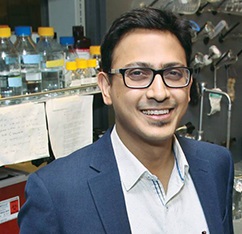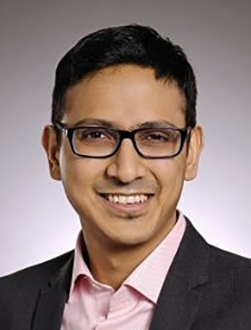TOWARDS UNIVERSALLY PROGRAMMABLE CHIP-SCALE THZ SOURCE, SENSORS AND SYSTEMS: BRIDGING THE THZ AND APPLICATION GAP IN THE NEXT DECADE

Silicon-based Terahertz systems is a field that is only about a decade old. In this time, we have seen a phenomenal growth of silicon systems operating at THz frequencies for a wide range of applications in sensing, imaging and communication. It can be argued that both the ‘THz gap’ and the ‘technology and applications gap’ is closing in meaningful ways in the THz range. Technologies beyond 100 GHz focusing on sensing, imaging and wireless back-haul links are getting attractive as we enter into a new area of highly dense network of autonomous systems requiring ultra-high speed and reliable links.
In order to move beyond this inflection point as Moore’s law continue to slow, I will discuss why we need to look beyond the classical ‘device’-level metrics of efficiency and sensitivity of THz sources and detectors towards holistic ‘system’ level properties such as scalability and programmability. Such properties are critically important for applications in sensing and imaging, as evidenced across sensor fusion technologies across mmWave, IR and optical frequencies. The ultimate programmability in THz sources and sensors is one that can synthesize or receive THz fields with arbitrary configuration and spectrum. In this talk, I will highlight approaches that cut across electromagnetics, circuits, systems and signal processing, to allow for such reconfigurability in THz signal synthesis and sensing, yet realized with devices that are themselves not very efficient. Particularly, we will demonstrate approaches to THz CMOS sensors reconfigurable across the three field properties of spectrum (100 GHz-1000 GHz), beam pattern and polarization, programmable THz metasurfaces with CMOS tiling, and enabling dynamic spectrum shaping and physically secure sub-THz links. In the end, I will comment on what could be the major directions for the field in the coming decade.
Date and Time
Location
Hosts
Registration
-
 Add Event to Calendar
Add Event to Calendar
Loading virtual attendance info...
Speakers
 Kaushik Sengupta of Princeton University
Kaushik Sengupta of Princeton University
TOWARDS UNIVERSALLY PROGRAMMABLE CHIP-SCALE THZ SOURCE, SENSORS AND SYSTEMS: BRIDGING THE THZ AND APPLICATION GAP IN THE
Silicon-based Terahertz systems is a field that is only about a decade old. In this time, we have seen a phenomenal growth of silicon systems operating at THz frequencies for a wide range of applications in sensing, imaging and communication. It can be argued that both the ‘THz gap’ and the ‘technology and applications gap’ is closing in meaningful ways in the THz range. Technologies beyond 100 GHz focusing on sensing, imaging and wireless back-haul links are getting attractive as we enter into a new area of highly dense network of autonomous systems requiring ultra-high speed and reliable links.
In order to move beyond this inflection point as Moore’s law continue to slow, I will discuss why we need to look beyond the classical ‘device’-level metrics of efficiency and sensitivity of THz sources and detectors towards holistic ‘system’ level properties such as scalability and programmability. Such properties are critically important for applications in sensing and imaging, as evidenced across sensor fusion technologies across mmWave, IR and optical frequencies. The ultimate programmability in THz sources and sensors is one that can synthesize or receive THz fields with arbitrary configuration and spectrum. In this talk, I will highlight approaches that cut across electromagnetics, circuits, systems and signal processing, to allow for such reconfigurability in THz signal synthesis and sensing, yet realized with devices that are themselves not very efficient. Particularly, we will demonstrate approaches to THz CMOS sensors reconfigurable across the three field properties of spectrum (100 GHz-1000 GHz), beam pattern and polarization, programmable THz metasurfaces with CMOS tiling, and enabling dynamic spectrum shaping and physically secure sub-THz links. In the end, I will comment on what could be the major directions for the field in the coming decade.
Biography:
Kaushik Sengupta received the B.Tech. and M.Tech. degrees in electronics and electrical communication engineering from IIT Kharagpur, Kharagpur, India, in 2007, and the M.S. and Ph.D. degrees in electrical engineering from the California Institute of Technology (Caltech), Pasadena, CA, USA, in 2008 and 2012, respectively. In 2013, he joined the Department of Electrical Engineering, Princeton University, Princeton, NJ, USA, as a Faculty Member. His current research interests include high-frequency ICs, electromagnetics, and optics for various applications in sensing, imaging, and high-speed communication. Dr. Sengupta received the Bell Labs Prize (2017), Young Investigator Program (YIP) Award from the Office of Naval Research in 2017, the DARPA Young Faculty Award (2018) E. Lawrence Keys, Jr./Emerson Electric Co. Junior Faculty Award and the 2015 IEEE MTT-S Microwave Prize. He serves on the Steering committee in IEEE IMS, in the Technical Program Committee of IEEE CIC, member of the MTT-4 Committee on Terahertz technology, and has served as a Guest Editor of IEEE Journal of Solid-State Circuits. He has served as Distinguished Lecturer for IEEE Solid-State Circuits Society from 2019-2020, and is currently serving as Distinguished Lecturer for IEEE Microwave Theory and Techniques society from 2021-2023. He is the recipient of the Outstanding Young Engineer Award from the IEEE Microwave Theory and Techniques society in 2021.
Agenda
1030am-1055am Meet and greet Prof. Sengupta
1055am-11am Welcome and housekeeping announcements
11am-1230pm Prof. Sengupta's talk
1230pm-1pm Q&A

